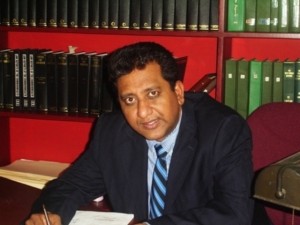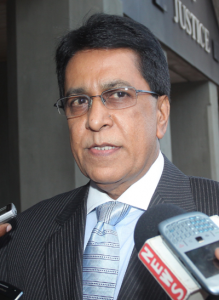
Senior Counsel Seenath Jairam said that the government has a strong case in its budget cuts motion in the High Court, arguing that the opposition does not have a right to reduce the budget under the Constitution. His comments came on Tuesday at the conclusion of a hearing into the matter being held before acting Chief Justice Ian Chang.
Jairam has been retained by the Attorney General in the high-profile case. He told media operatives that the Donald Ramotar administration’s position that the opposition cannot slash the budget is correct.
“In my view, if the opposition has a right to reduce the budget, they’ll be frustrating the will of the executive. They don’t have a right to reduce under the Constitution. They may withhold their approval but they don’t have a right to reduce,” he said.
However, the combined opposition is maintaining that the court cannot order the restoration of the over Gy$20 billion slashed from the national budget as they wrapped up their arguments in response to a government motion to have the National Assembly’s decision reversed.
SC Jairam said that despite the arguments, the government has a strong case, since the opposition’s argument that there is no separation of powers under the Constitution is a constitutional heresy.
“Guyana like all Commonwealth countries always enjoys the separation of powers, that is to say, the executive, the judiciary and the legislative. While he stated that withholding approval of the budget is a different constitutional argument, SC Jairam said that under Article 65, “Parliament may make laws for the peace, order and the good governance of Guyana. You cannot reduce the budget by Gy$1, causing people who are employed by the state agencies to be dismissed through no fault of their own. That is chaos.” He said, “If monies are not approved how are they to be paid? …Common sense tells us that unless monies are voted for the particular areas, there will have to be dislocation in employment.”
By virtue of an ex parte application by way of affidavit for interim orders filed by Attorney General and Legal Affairs Minister Anil Nandlall, government argued that “no power resides in the National Assembly, either in the Committee of Supply, or at all, to move an amendment to reduce any aspect of the Annual Estimates of Revenues and Expenditure laid by the finance minister, and certainly, the National Assembly has no power whatsoever, in proposing a new, or different sum, or any sum at all.”




